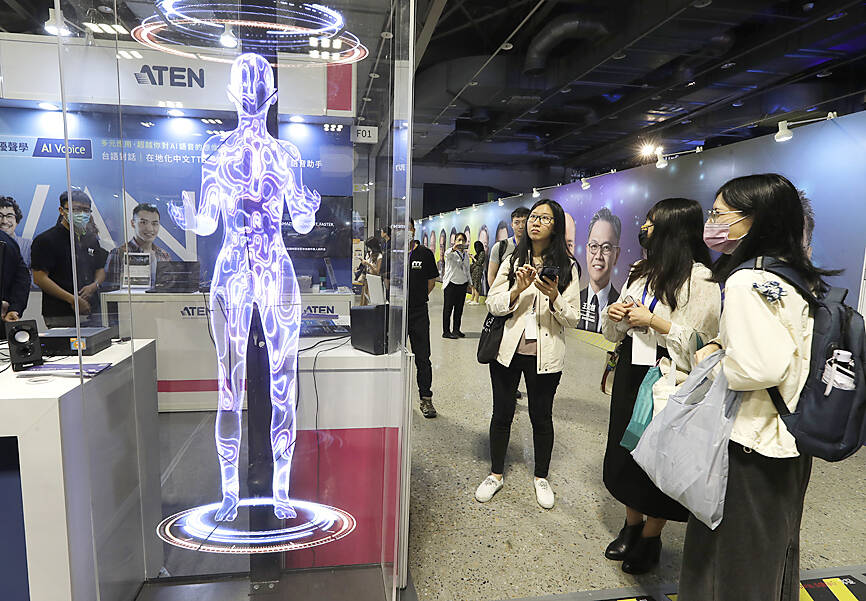The Ministry of Economic Affairs (MOEA) is planning measures to cultivate 200,000 people with artificial intelligence (AI) skills, Minister of Economic Affairs J.W. Kuo (郭智輝) said yesterday.
Speaking at the opening ceremony of the AI EXPO Taiwan exhibition in Taipei, Kuo said AI talent is key to economic and industrial development, and to integrating AI into Taiwan’s industrial transformation.
The ministry is planning tax incentives, encouraging industry-academic cooperation and competitions attractive to younger generations to encourage the spawning of AI talent, he said.

Photo: Chiang Ying-ying, AP
Small and medium-sized enterprises, which make up 98 percent of Taiwan’s businesses, might have a hard time implementing AI because of their relatively small sizes, Kuo said.
Therefore, institutions such as the Metal Industries Research and Development Center (金屬工業研究發展中心) would establish AI demonstration sites to assist businesses in different sectors in introducing AI applications, he said.
According to forecasts from research institutions, the generative AI market would grow from US$40 billion last year to US$1.5 trillion in 2030, Kuo said.
Meanwhile, Deputy Minister of Digital Affairs Lin Yi-jing (林宜敬) said the Ministry of Digital Affairs would collaborate with the MOEA, the National Development Council (NDC) and the National Science and Technology Council to train AI talent on applying current AI tools, running training models, and doing basic research and development.
While AI would change the world, its innovation and development should come from open competition in the private sector rather than from a domineering government, Lin said.
The government could support it by using tools such as computing power, data, talent, marketing and funding to create an environment to develop AI, he said.
It could also provide free computing power to start-ups and encourage ministries to release government data for start-ups to train AI models, he said.
In addition, the ministry would organize meetings with potential clients for local businesses, try to drum up orders for Taiwanese AI start-ups and create stable revenues, Lin said.
The ministry has secured NT$10 billion (US$302.14 million) in funding from the NDC to invest in the AI industry over the next 10 years, he said.
AI EXPO Taiwan is being held from yesterday until tomorrow at the Taipei Expo Park with the theme “Surfing the AI Waves.”

POWERING UP: PSUs for AI servers made up about 50% of Delta’s total server PSU revenue during the first three quarters of last year, the company said Power supply and electronic components maker Delta Electronics Inc (台達電) reported record-high revenue of NT$161.61 billion (US$5.11 billion) for last quarter and said it remains positive about this quarter. Last quarter’s figure was up 7.6 percent from the previous quarter and 41.51 percent higher than a year earlier, and largely in line with Yuanta Securities Investment Consulting Co’s (元大投顧) forecast of NT$160 billion. Delta’s annual revenue last year rose 31.76 percent year-on-year to NT$554.89 billion, also a record high for the company. Its strong performance reflected continued demand for high-performance power solutions and advanced liquid-cooling products used in artificial intelligence (AI) data centers,

SIZE MATTERS: TSMC started phasing out 8-inch wafer production last year, while Samsung is more aggressively retiring 8-inch capacity, TrendForce said Chipmakers are expected to raise prices of 8-inch wafers by up to 20 percent this year on concern over supply constraints as major contract chipmakers Taiwan Semiconductor Manufacturing Co (TSMC, 台積電) and Samsung Electronics Co gradually retire less advanced wafer capacity, TrendForce Corp (集邦科技) said yesterday. It is the first significant across-the-board price hike since a global semiconductor correction in 2023, the Taipei-based market researcher said in a report. Global 8-inch wafer capacity slid 0.3 percent year-on-year last year, although 8-inch wafer prices still hovered at relatively stable levels throughout the year, TrendForce said. The downward trend is expected to continue this year,

Vincent Wei led fellow Singaporean farmers around an empty Malaysian plot, laying out plans for a greenhouse and rows of leafy vegetables. What he pitched was not just space for crops, but a lifeline for growers struggling to make ends meet in a city-state with high prices and little vacant land. The future agriculture hub is part of a joint special economic zone launched last year by the two neighbors, expected to cost US$123 million and produce 10,000 tonnes of fresh produce annually. It is attracting Singaporean farmers with promises of cheaper land, labor and energy just over the border.

A proposed billionaires’ tax in California has ignited a political uproar in Silicon Valley, with tech titans threatening to leave the state while California Governor Gavin Newsom of the Democratic Party maneuvers to defeat a levy that he fears would lead to an exodus of wealth. A technology mecca, California has more billionaires than any other US state — a few hundred, by some estimates. About half its personal income tax revenue, a financial backbone in the nearly US$350 billion budget, comes from the top 1 percent of earners. A large healthcare union is attempting to place a proposal before